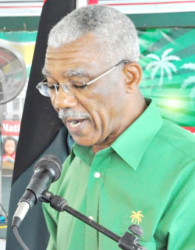President David Granger yesterday said his administration will not undermine the professionalism of media workers, whether they are members of the state or privately-owned media.
“The Government of Guyana is committed to the promotion of a high degree of media professionalism. My administration will not undermine professionalism of state media workers by subjecting them to political direction or interference in their work,” he told a Guyana Press Association workshop yesterday.
The Head of State added that his administration is also committed to noninterference in independent media who act as watchdogs of the government.
“There is no good reason for state to interfere in the work of the private media. The relationship between the state and private media must be seen as a partnership in providing a public good. Independence of thought must be preserved,” he said.
On Monday, the government had rejected claims by the GPA that state media workers were suffering due to intimidation and political interference in their work.

In a press statement, the Department of Public Information sought to downplay concerns that the continuing interventions, particularly by Prime Minister Moses Nagamootoo and Director of Public Information Imran Khan, amounted to intimidation.
“The Government of Guyana strongly refutes that the state media personnel are intimidated during the Prime Minister’s weekly meetings. The Office of the Prime Minister has received no complaints from the Board of Directors or management of any state media entity of intimidation or interference. No member of the Guyana Press Association attending these meetings has made any objections,” it said.
In its letter to President Granger, dated April 13, the GPA said it had “deep concern” regarding interference in the work of the state media by government ministers, departments and officials of the administration.
It cited Nagamootoo’s weekly meetings with the state media, including the Government Information Agency, and it said “clear directives” are given regarding propaganda to be dispensed by these agencies.
“It is our considered view that such meetings not only bear the hallmarks of government interference in the work of the state media, but also constitute a grave act of intimidation into slavishly following the dictates of the executive government,” it added.
The GPA also accused Khan of seeking to dictate the content of NCN and the Guyana Chronicle, and in some cases having content removed. “On other occasions, there are reports that Mr Khan has criticised and even berated workers of the state media. This clearly amounts to acts of intimidation and causes these state media workers to practice self-censorship,” the letter stated.
State presence
Meanwhile, President Granger maintained at yesterday’s workshop that the state will continue to have a presence in the media.
He justified this position by arguing that private media in Guyana is primarily located on the coastland. “They are not located in rural and hinterland areas. They do not possess sufficient resources to provide public information to all of the citizens. State media therefore have a duty to provide information to all of the citizens,” he said.
The state, he stressed, has an obligation to provide information to the public. This obligation is exercised through state media which are those agencies controlled financially and editorially by the government.
According to the Head of State, state media have a duty to report on national development. Such information, he contended, is often not sensational enough to be reported by private media but state media will continue present same in a dispassionate and professional manner as the administration pursues a policy to develop 10 strong regions with 10 capital towns each of which can contribute to the communication gap by establishing its own newspaper.
However, he stressed that state media entities are not intended to compete for or to dominate the information space.
Later on his weekly broadcast, “The Public Interest,” Granger explained that eventually the state must withdraw from competing with private media
While GINA and NCN could continue, commercial arms such as the Chronicle should revert to private ownership in “due course,” he said.




